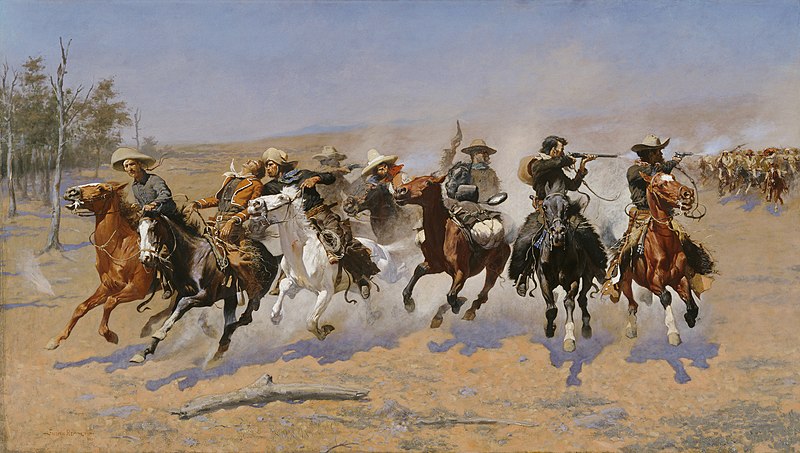1
Frederic Remington was 28 when he painted A Dash For The Timber in 1889. He kept intricate sketchbooks of his observations of the U.S. Cavalry in the southwest frontier as it conducted surveillance and reconnaissance operations. He honed his technique with color and motion to vary contrast with the quality of light and shadow. He possessed a particular gift for portraying the gait of a horse in full stride. He felt an artist must know more than what he sees to fully render the purest form of an object in motion; to exaggerate a moving horse to achieve the desired effect.
A Dash For The Timber is arresting. The grandiloquent image of a split-second in time depicts eight rough riders and one unmounted packhorse in a dead gallop as a violent war party presses to overrun them. Three of those men in the lead are shooting over their shoulders–two with long rifles, one with a pistol–as they race for the cover of a phalanx of timbers just up ahead. The horses are strained to their mortal limit, nostrils flaring, eyes bulging in a collective lidless glare of terror–the steeds nearly appear to convey a desperate sense of drowning, gasping for air in plain sight.
Remington painted a landscape of authenticity.
2
I had a graduate professor at the Center for Information and Communication Sciences at Ball State University who greeted me at the door to his classroom with a resounding, What Fresh Hell Is This?! Within the beat of this salutation he’d wink and then smile. I admired the man.
*****
In life we are usually too easily fooled. We are made to assume that the circumstance tied to the place we inhabit, at any given moment, is the reason for being there in the first place. We go to church on Sunday and remember to fear God or the unknowns of the idea of God, whoever He might really be; we go to school to be measured against all we cannot know and ranked amongst our peers in an impossibly uneven manner; we are employed by corporations insistent and convinced of their own proximal hubris where human capital is just an algorithm for an insular output and outcome. For all the power and importance shimmering in the halls of faith and learning and commerce, the single greatest deficit each suffers from is far too usually an utter lack of imagination. The world doesn’t mind, it will proceed forward just as it always has, but the impact at an individual level has a fraying effect on the authenticity and purity of the self and if we aren’t careful, eventually we forget who we really are and the bright burning light we bring into the halls we pass through in life.
I learned a lot in graduate school but what I keep with me every day is the salutation my professor offered me when I entered his classroom. He was declaring something I haven’t forgotten. He might have been suggesting something more; it is hard to know if he was and all these years later I can only speculate. What remains is a point of present consideration that maybe the only way to enter into any unknown is to do so with the fresh hell of authenticity.
3
My Dad was a Yellow-Page man–he was the best sales gun I’ve ever known. In our house above our mantel he hung Remington’s A Dash For The Timber. I saw that painting every day of my life–sometimes I would take a moment and look really hard at it. If I wasn’t looking at it, I was subconsciously aware of it and maybe I knew it would remain with me long after I’d moved on with my own life.
When Dad was on the road selling advertising for the yellow pages across Idaho, Wyoming, Montana, Utah, and Colorado I never gave much thought about what it was he was up against every day or the distances he covered to get where he was going so that we had what we needed back home. He brought the fresh hell of his own authenticity every day of his life and certainly to that job–the man never stopped moving.
Today when I see the rough rider on the furious black steed firing that long rifle over his shoulder in Remington’s painting, I see Dad. He was always out there stirring up the possibilities he set in motion with a purity of his own authenticity. I wish Dad was around today so that I could tell him what I understand now as a man and sales gun of his own making a dead-gallop-dash for the timber up ahead.
*****
Being authentic is hard. To stir the pot in pursuit of something real is high-risk and usually the reward comes far too late for a world hell-bent on short-term gain. Authenticity isn’t about control, it’s about vision and tenacity and narrative and putting beauty into the void where color and light and shadow didn’t exist until you arrived to paint it yourself. If your originality is pure enough, one day, the rest of the world will see it too–maybe not in a grand manner, or as a framed painting on a wall above some mantel, but rather as a feeling of something you left behind as you passed on through. The hope is to make those important hallways less important and possibly more human–to change how someone thinks, not about the world, but about herself.
I hope when it’s all over, I’m not asked, on the far side of this great divide, what title I achieved or how much I earned, lost, or never had a shot at. I want to be greeted just as I was by my professor at the Center for Information and Communication Sciences at Ball State University…
WHAT FRESH HELL IS THIS?!
RCS
19 March, 2023
Austin, Texas

